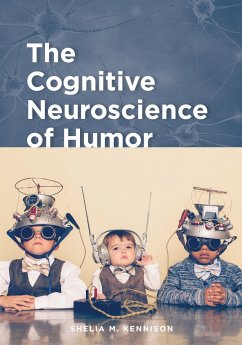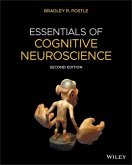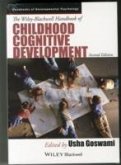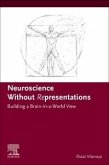Shelia M Kennison
The Cognitive Neuroscience of Humor
Shelia M Kennison
The Cognitive Neuroscience of Humor
- Broschiertes Buch
- Merkliste
- Auf die Merkliste
- Bewerten Bewerten
- Teilen
- Produkt teilen
- Produkterinnerung
- Produkterinnerung
Cognitive psychologist Shelia M. Kennison examines how humor is involved in cognition and memory, human development, and overall mental and physical health.
Andere Kunden interessierten sich auch für
![Essentials of Cognitive Neuroscience Essentials of Cognitive Neuroscience]() Bradley R PostleEssentials of Cognitive Neuroscience162,99 €
Bradley R PostleEssentials of Cognitive Neuroscience162,99 €![Out of Our Heads Out of Our Heads]() Alva NoëOut of Our Heads17,99 €
Alva NoëOut of Our Heads17,99 €![Brain Science For The Soul Brain Science For The Soul]() Adriana VelaBrain Science For The Soul27,99 €
Adriana VelaBrain Science For The Soul27,99 €![The Wiley-Blackwell Handbook of Childhood Cognitive Development 2e and Developmental Cognitive Neuroscience 4e The Wiley-Blackwell Handbook of Childhood Cognitive Development 2e and Developmental Cognitive Neuroscience 4e]() Usha GoswamiThe Wiley-Blackwell Handbook of Childhood Cognitive Development 2e and Developmental Cognitive Neuroscience 4e86,99 €
Usha GoswamiThe Wiley-Blackwell Handbook of Childhood Cognitive Development 2e and Developmental Cognitive Neuroscience 4e86,99 €![Social Neuroscience Social Neuroscience]() Social Neuroscience88,99 €
Social Neuroscience88,99 €![Neuroscience Without Representations Neuroscience Without Representations]() Óscar VilarroyaNeuroscience Without Representations164,99 €
Óscar VilarroyaNeuroscience Without Representations164,99 €![Cognitive Dissonance Cognitive Dissonance]() Cognitive Dissonance64,99 €
Cognitive Dissonance64,99 €-
-
-
Cognitive psychologist Shelia M. Kennison examines how humor is involved in cognition and memory, human development, and overall mental and physical health.
Hinweis: Dieser Artikel kann nur an eine deutsche Lieferadresse ausgeliefert werden.
Hinweis: Dieser Artikel kann nur an eine deutsche Lieferadresse ausgeliefert werden.
Produktdetails
- Produktdetails
- Verlag: American Psychological Association (APA)
- Seitenzahl: 247
- Erscheinungstermin: 28. Juli 2020
- Englisch
- Abmessung: 249mm x 175mm x 15mm
- Gewicht: 431g
- ISBN-13: 9781433832055
- ISBN-10: 1433832054
- Artikelnr.: 58022673
- Herstellerkennzeichnung
- Produktsicherheitsverantwortliche/r
- Europaallee 1
- 36244 Bad Hersfeld
- gpsr@libri.de
- Verlag: American Psychological Association (APA)
- Seitenzahl: 247
- Erscheinungstermin: 28. Juli 2020
- Englisch
- Abmessung: 249mm x 175mm x 15mm
- Gewicht: 431g
- ISBN-13: 9781433832055
- ISBN-10: 1433832054
- Artikelnr.: 58022673
- Herstellerkennzeichnung
- Produktsicherheitsverantwortliche/r
- Europaallee 1
- 36244 Bad Hersfeld
- gpsr@libri.de
Shelia M. Kennison is Professor of Psychology at Oklahoma State University. She earned her PhD in cognitive psychology from the University of Massachusetts at Amherst and bachelor’s degree in psychology and linguistics from Harvard University. She is a fellow of the American Psychological Association and the Psychonomic Society. Her research interests include humor, language processing in monolinguals and bilinguals, and individual differences in verbal and physical risk-taking. She has published numerous research articles. Her previous books include the textbooks An Introduction to Language Development and Psychology of Language: Theory and Applications. She lives in Perkins, Oklahoma. Visit http://sheliakennison.wix.com/cognitivesciencelab and follow @skennison on Twitter.
List of Tables and Figures
Preface
Acknowledgments
Introduction
1. Theories and Early Methodologies
Theoretical Considerations
Early Methodologies in the Cognitive Neuroscience of Humor
Summary
2. Abnormal Humor Processing Due to Brain Aging, Injury, and Degeneration
Humor Processing in Older Adults
Humor Processing Following Brain Damage
Humor Processing in Degenerative Brain Diseases
Pathological Laughter: When Laughter and Mirth Occur Without a Triggering
Event
Summary
3. Electroencephalography Studies of Humor Comprehension
Overview of Electroencephalography Methodology
Early Electroencephalography/Event-Related Brain Potential Studies of Humor
Comprehension
The Three-Stage Model of Humor Comprehension
Summary
4. fMRI Studies of Humor
Overview of the fMRI Methodology
Early fMRI Studies of Humor Comprehension
fMRI Evidence for a Three-Stage Model of Humor Comprehension
Summary
5. Brain Stimulation Studies of Laughter, Mirth, and Humor Processing
Electrical Brain Stimulation
Deep Brain Stimulation
Transcranial Brain Stimulation
Summary
6. The Development of Humor in Typical and Atypical Individuals
Mirth, Smiling, and Laughing in Infants
Humor Development in Young Children
Humor in Atypical Development
Summary
7. Individual Differences in Humor
Gender Differences
Differences in Social Status
Personality Differences
Ability: Professional Versus Novice Comedians
Humor and Heredity
Summary
8. The Effects of Humor on the Mind and Body
Humor and Health
Physiological Effects of Humor
The Effectiveness of Humor Interventions
Summary
9. Evolutionary Perspectives on Humor
Smiling, Laughing, and Playing Across Species
Evolutionary Advantages of Humor
Evolutionary Changes in Humor-Related Brain Regions
Summary
10. Future Directions
A Neural Signature of Humor
Future Directions in Health Research
Future Directions in Cross-Cultural Differences Research
Future Directions in Research on Education and Training
Closing Remarks
Glossary
References
Index
About the Author
Preface
Acknowledgments
Introduction
1. Theories and Early Methodologies
Theoretical Considerations
Early Methodologies in the Cognitive Neuroscience of Humor
Summary
2. Abnormal Humor Processing Due to Brain Aging, Injury, and Degeneration
Humor Processing in Older Adults
Humor Processing Following Brain Damage
Humor Processing in Degenerative Brain Diseases
Pathological Laughter: When Laughter and Mirth Occur Without a Triggering
Event
Summary
3. Electroencephalography Studies of Humor Comprehension
Overview of Electroencephalography Methodology
Early Electroencephalography/Event-Related Brain Potential Studies of Humor
Comprehension
The Three-Stage Model of Humor Comprehension
Summary
4. fMRI Studies of Humor
Overview of the fMRI Methodology
Early fMRI Studies of Humor Comprehension
fMRI Evidence for a Three-Stage Model of Humor Comprehension
Summary
5. Brain Stimulation Studies of Laughter, Mirth, and Humor Processing
Electrical Brain Stimulation
Deep Brain Stimulation
Transcranial Brain Stimulation
Summary
6. The Development of Humor in Typical and Atypical Individuals
Mirth, Smiling, and Laughing in Infants
Humor Development in Young Children
Humor in Atypical Development
Summary
7. Individual Differences in Humor
Gender Differences
Differences in Social Status
Personality Differences
Ability: Professional Versus Novice Comedians
Humor and Heredity
Summary
8. The Effects of Humor on the Mind and Body
Humor and Health
Physiological Effects of Humor
The Effectiveness of Humor Interventions
Summary
9. Evolutionary Perspectives on Humor
Smiling, Laughing, and Playing Across Species
Evolutionary Advantages of Humor
Evolutionary Changes in Humor-Related Brain Regions
Summary
10. Future Directions
A Neural Signature of Humor
Future Directions in Health Research
Future Directions in Cross-Cultural Differences Research
Future Directions in Research on Education and Training
Closing Remarks
Glossary
References
Index
About the Author
List of Tables and Figures
Preface
Acknowledgments
Introduction
1. Theories and Early Methodologies
Theoretical Considerations
Early Methodologies in the Cognitive Neuroscience of Humor
Summary
2. Abnormal Humor Processing Due to Brain Aging, Injury, and Degeneration
Humor Processing in Older Adults
Humor Processing Following Brain Damage
Humor Processing in Degenerative Brain Diseases
Pathological Laughter: When Laughter and Mirth Occur Without a Triggering
Event
Summary
3. Electroencephalography Studies of Humor Comprehension
Overview of Electroencephalography Methodology
Early Electroencephalography/Event-Related Brain Potential Studies of Humor
Comprehension
The Three-Stage Model of Humor Comprehension
Summary
4. fMRI Studies of Humor
Overview of the fMRI Methodology
Early fMRI Studies of Humor Comprehension
fMRI Evidence for a Three-Stage Model of Humor Comprehension
Summary
5. Brain Stimulation Studies of Laughter, Mirth, and Humor Processing
Electrical Brain Stimulation
Deep Brain Stimulation
Transcranial Brain Stimulation
Summary
6. The Development of Humor in Typical and Atypical Individuals
Mirth, Smiling, and Laughing in Infants
Humor Development in Young Children
Humor in Atypical Development
Summary
7. Individual Differences in Humor
Gender Differences
Differences in Social Status
Personality Differences
Ability: Professional Versus Novice Comedians
Humor and Heredity
Summary
8. The Effects of Humor on the Mind and Body
Humor and Health
Physiological Effects of Humor
The Effectiveness of Humor Interventions
Summary
9. Evolutionary Perspectives on Humor
Smiling, Laughing, and Playing Across Species
Evolutionary Advantages of Humor
Evolutionary Changes in Humor-Related Brain Regions
Summary
10. Future Directions
A Neural Signature of Humor
Future Directions in Health Research
Future Directions in Cross-Cultural Differences Research
Future Directions in Research on Education and Training
Closing Remarks
Glossary
References
Index
About the Author
Preface
Acknowledgments
Introduction
1. Theories and Early Methodologies
Theoretical Considerations
Early Methodologies in the Cognitive Neuroscience of Humor
Summary
2. Abnormal Humor Processing Due to Brain Aging, Injury, and Degeneration
Humor Processing in Older Adults
Humor Processing Following Brain Damage
Humor Processing in Degenerative Brain Diseases
Pathological Laughter: When Laughter and Mirth Occur Without a Triggering
Event
Summary
3. Electroencephalography Studies of Humor Comprehension
Overview of Electroencephalography Methodology
Early Electroencephalography/Event-Related Brain Potential Studies of Humor
Comprehension
The Three-Stage Model of Humor Comprehension
Summary
4. fMRI Studies of Humor
Overview of the fMRI Methodology
Early fMRI Studies of Humor Comprehension
fMRI Evidence for a Three-Stage Model of Humor Comprehension
Summary
5. Brain Stimulation Studies of Laughter, Mirth, and Humor Processing
Electrical Brain Stimulation
Deep Brain Stimulation
Transcranial Brain Stimulation
Summary
6. The Development of Humor in Typical and Atypical Individuals
Mirth, Smiling, and Laughing in Infants
Humor Development in Young Children
Humor in Atypical Development
Summary
7. Individual Differences in Humor
Gender Differences
Differences in Social Status
Personality Differences
Ability: Professional Versus Novice Comedians
Humor and Heredity
Summary
8. The Effects of Humor on the Mind and Body
Humor and Health
Physiological Effects of Humor
The Effectiveness of Humor Interventions
Summary
9. Evolutionary Perspectives on Humor
Smiling, Laughing, and Playing Across Species
Evolutionary Advantages of Humor
Evolutionary Changes in Humor-Related Brain Regions
Summary
10. Future Directions
A Neural Signature of Humor
Future Directions in Health Research
Future Directions in Cross-Cultural Differences Research
Future Directions in Research on Education and Training
Closing Remarks
Glossary
References
Index
About the Author








